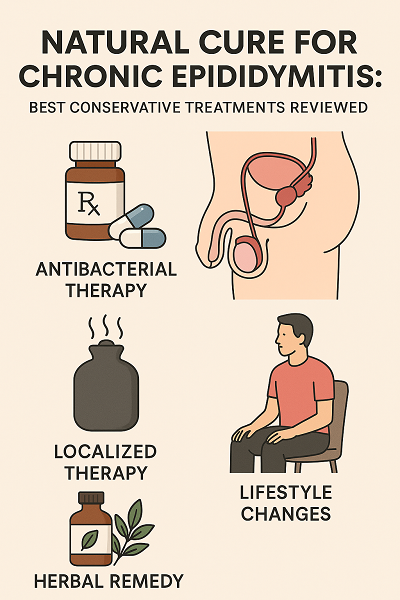Natural Cure for Chronic Epididymitis: Best Conservative Treatments Reviewed
Chronic epididymitis, characterized by long-term inflammation of the epididymis, is a frustrating and often painful condition that affects many men. Unlike acute epididymitis, which develops suddenly and resolves quickly with antibiotics, chronic epididymitis tends to linger, recur, and resist standard treatments.
The good news is that surgery is rarely necessary, and most men can experience significant relief through conservative treatment options. This article will walk you through the best non-surgical approaches—including medication, home remedies, and herbal solutions like the Diuretic and Anti-inflammatory Pill—to manage chronic epididymitis safely and effectively.

Understanding Chronic Epididymitis
The epididymis is a coiled tube located at the back of the testicle that stores and transports sperm. When it becomes inflamed—whether due to infection, trauma, or autoimmune factors—it leads to discomfort in the scrotum, often described as dull aching or heaviness. Chronic epididymitis is typically defined as symptoms lasting for 6 weeks or more, and may present intermittently.
Common causes include:
- Inadequately treated acute epididymitis
- Sexually transmitted infections (e.g., chlamydia, gonorrhea)
- Urinary tract infections
- Prostate issues or reflux of urine into the epididymis
- Long-term sitting or pressure (e.g., from cycling or desk jobs)
First-Line Conservative Treatment: Antibiotics
Antibiotics remain the cornerstone of treatment when a bacterial infection is suspected. Doctors may choose antibiotics based on culture results or empirical treatment if no bacteria are isolated.
Commonly prescribed antibiotics:
- Fluoroquinolones: levofloxacin, ciprofloxacin
- Tetracyclines: doxycycline
- Macrolides: azithromycin
- Cephalosporins: ceftriaxone, cefotaxime
Important considerations:
- Complete the full course, even if symptoms improve early
- Report any side effects such as nausea, diarrhea, or rashes
- Avoid alcohol and certain foods if contraindicated with the medication
Unfortunately, many cases of chronic epididymitis are non-bacterial, making antibiotics less effective. This is where alternative approaches become essential.
Local Therapy to Relieve Symptoms
Warm Compress:
Applying a warm compress to the scrotum helps improve circulation, reduce swelling, and ease pain. Use a warm towel (not hot!) for 20–30 minutes, 2–3 times daily.
Warm Sitz Baths:
Soaking the perineal area in warm water also promotes blood flow and muscle relaxation. It can be especially helpful if your pain is associated with pelvic tension or muscle spasm.
Tip: Combine warm baths with gentle breathing exercises for added relaxation.
Traditional Chinese Medicine Approach
One of the most promising natural treatments is the Diuretic and Anti-inflammatory Pill, a patented herbal formula rooted in traditional Chinese medicine (TCM). It targets not just the symptoms but the internal imbalances that cause chronic inflammation.
Key benefits of the Diuretic and Anti-inflammatory Pill for Epididymitis:
- Clears heat and toxins from the urogenital system
- Promotes blood circulation and reduces congestion
- Improves immune function and tissue repair
- Safe for long-term use with minimal side effects
Many patients with recurring or antibiotic-resistant epididymitis report marked improvements within 1–3 months of consistent use.
Want to know if this formula is right for you? Visit our doctors for more details.
5. Lifestyle Changes That Support Recovery
Conservative treatment isn't complete without daily habit adjustments. Chronic inflammation often results from a combination of poor circulation, stress, and unhealthy routines.
Avoid Prolonged Sitting:
Sitting for hours—especially with poor posture—compresses the scrotum and impairs lymphatic flow. Take short walking breaks every 30–45 minutes.
Eat a Healing Diet:
Consume whole, unprocessed foods. Focus on anti-inflammatory foods such as:
- Green leafy vegetables
- Berries, citrus, and papaya
- Whole grains (e.g., oats, quinoa)
- Omega-3-rich foods (like walnuts and flaxseed)
Avoid:
- Spicy and greasy foods
- Caffeine and alcohol
- Smoking
Prioritize Hygiene:
Keep the groin area clean and dry. Shower daily, wear breathable underwear, and change undergarments regularly.
Mental Health and Emotional Resilience
Chronic pain conditions like epididymitis often bring emotional stress, anxiety, and frustration. Mental health is an essential aspect of physical healing.
Suggestions:
- Practice relaxation techniques: deep breathing, meditation, or yoga
- Seek support from friends, a therapist, or support groups
- Avoid self-diagnosis or internet anxiety—consult trusted professionals
Staying optimistic and committed to long-term care is crucial, as chronic conditions often improve gradually.
Final Thoughts: A Comprehensive and Natural Path to Healing
Chronic epididymitis doesn't have to control your life. Through a combination of antibiotic management, natural therapies, lifestyle changes, and herbal medicine like the Diuretic and Anti-inflammatory Pill, many men have reclaimed their comfort and well-being.
If you're tired of recurring pain and short-lived relief, now is the time to take a more holistic and sustainable approach. Let your recovery journey begin today.
Explore our natural treatment solutions at www.diureticspill.com



